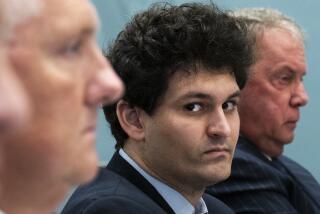SEC Self-Financing Plan Finds Support : Ruder Tells House Panel Agency Can Fund Itself Through Fees
- Share via
WASHINGTON — A House panel voiced tentative support Tuesday for a proposal to allow the Securities and Exchange Commission to become self-financing by tapping millions of dollars in annual fees.
The money would help boost the SEC’s limited resources for such battles as its securities fraud case against the giant investment firm Drexel Burnham Lambert Inc.
SEC Chairman David S. Ruder told a subcommittee hearing chaired by Rep. John Dingell (D-Mich.) that the Drexel case dramatized the paltry resources of his agency, where there is a 20% annual turnover of staff lawyers who are lured to private firms by fatter salaries and better working conditions.
The SEC in September filed a civil suit charging Drexel and some of its employees, including “junk bond” chief Michael Milken, with insider trading, stock manipulation and other violations stemming from the ongoing Wall Street insider trading scandal.
Now in General Fund
The case has yet to go to court and Drexel has spent $75 million in legal fees and nearly $70 million in public relations and advertising costs--more than the SEC’s current budget of $142.6 million, the House Energy and Commerce subcommittee on oversight and investigations was told.
Pitting little more than a dozen of the regulatory agency’s poorly paid lawyers against more than 100 high-priced Wall Street attorneys representing Drexel “is like trying to fight Godzilla with a slingshot,” said Rep. Ron Wyden (D-Ore.).
Ruder endorsed proposals in a new SEC staff study to allow the agency to become self-financed by using the fees it collects for securities registrations, transactions and various filings. These fees, which totaled $248 million in fiscal 1988, are deposited in the Treasury’s general fund and are not available to the agency.
Dingell said that in the past few years, fee revenues have been more than double, or nearly double, the SEC’s annual appropriation.
“It is my firm view that something must be done to address the growing deficiencies in the resources available to the SEC to carry out its statutory responsibilities,” Dingell said. “It is also my view that something will be done.”
Ruder and several subcommittee members agreed that the most controversial proposal would be to create a permanent SEC trust and revolving fund, financed by fee collections, which the agency could spend under special authority of a congressional oversight committee.
The self-financing concept drew praise from Democrats and Republicans on the panel.
Wyden cited the SEC’s decision in September not to seek prosecution of suspected securities violations in the $2.25 billion default on municipal bonds issued by the Washington Public Power Supply System because of a lack of enforcement staff.
Enforcement Suffers
“The lesson is, if you’re going to mess up, mess up big,” Wyden said. “The fact is, the SEC just doesn’t have the resources to go after these big cases.”
Ruder said a self-financing mechanism would give the SEC flexibility to cope with the growing automation of securities markets, increasingly complex financial packages and trading techniques, sophisticated schemes for market manipulation and insider trading, escalating corporate takeover attempts and the rapid growth in U.S. and foreign securities markets.
Enforcement of securities laws has suffered because of SEC staff problems, such as starting salaries of $27,716 for young lawyers who can command as much as $71,000 in New York law firms, Ruder said.
“We have evidence of cases we could bring but don’t because we don’t have the resources to do it,” Ruder said. He refused to cite specifics, but said some of these cases involve “penny stock fraud” perpetrated against small investors by “boiler room operations” that move from city to city.
More to Read
Get the L.A. Times Politics newsletter
Deeply reported insights into legislation, politics and policy from Sacramento, Washington and beyond. In your inbox twice per week.
You may occasionally receive promotional content from the Los Angeles Times.










